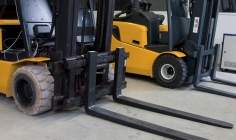
Despite operating in a market dominated by a limited number of industry specialists, materials handling funding is still a growing business, as Jonathan Minter reports
Those who work in materials handling finance like to view the sector as a general barometer for the economy at large due to the diversity of the market, with materials handling touching on retail, manufacturing, logistics and warehouses.
So it’s a good sign that Emma Irving, head of materials handling, asset finance, Aldermore, says the sector has been doing ‘fantastically’ for the past six months.
Her view is mirrored by other industry leaders who are also excited about the future potential of the sector. Andrew Woodward, head of materials handling at Investec Asset Finance, for example, says: "The market is on the upward trajectory, there seems to be a lot more positivity about the future out there."
Natalia Grigoreva, strategic marketing director at De Lage Landen (DLL), agrees that it has done well as countries come out of the recession. She adds that globally forklift truck sales grew by 7% in 2013 and by 10% in the first quarter of 2014. The figures she gives for Europe are a bit lower, 2% in 2013 and 7% in the first quarter 2014, but they also show a positive growth trend.
Eastern Europe
How well do you really know your competitors?
Access the most comprehensive Company Profiles on the market, powered by GlobalData. Save hours of research. Gain competitive edge.

Thank you!
Your download email will arrive shortly
Not ready to buy yet? Download a free sample
We are confident about the unique quality of our Company Profiles. However, we want you to make the most beneficial decision for your business, so we offer a free sample that you can download by submitting the below form
By GlobalDataShe does point out that, despite doing well in 2013, Eastern European sales have lagged behind due to a decrease in sales in Russia.
Aside from the struggles in Eastern Europe, this marks a general turnaround from the recession when, according to Woodward, "it sort of fell off the edge of a cliff", and was followed by a couple of slow years.
Talking about the UK industry, Irving says: "Everyone is feeling a bit more upbeat about the economy. Talking to dealers, they feel end-users are more confident. Plenty of quotations are being turned into offers, which means dealers are offering the right products and offering the correct financial solutions."
Woodward described this recovery as "across the board". Part of this growth is thanks to changes in health and safety, and he notes "with changes in health and safety regulations over the past few years, it means a couple of guys can’t get together and lift a box off a lorry like they used to in the past. They now require a forklift truck, so that’s helping the market to keep going."
While he says this has come about over the past four-to-five years, he adds: "It’s had an impact, but I wouldn’t say big. It just means additional trucks are required where in the past a business could have got away without using one."
Industry moves
Irving joined Aldermore from BNP Paribas in January, two months after Woodward left the company to head Investec’s materials handling team. When asked by Leasing Life about their respective moves, both appear happy with the result.
Although Investec has experience in the market in South Africa, it was new to the market in the UK when Woodward joined. Of his start he says: "It was a learning curve on all sides, but there’s commitment from both sides to make it all work. It’s early days but I think everyone is happy with how things are going and we’re writing business in excess of what was expected."
Woodward, who also joined Aldermore from BNP in 2010, says he enjoys the commitment Investec has shown his team since he joined. An example of this is a materials handling app which was designed and released after he joined, which has since been adopted in the broker space.
Although five other members of Aldermore’s materials handling team went with Woodward to Investec, a number remained, and Irving is keen to stress that, aside from herself, the rest of Aldermore’s current team were already there before she joined.
Improvement
Irving describes her start at Aldermore as an opportunity to review the operations and highlight areas for improvement. Although she says the team was already performing well, and that the direction hasn’t changed under her leadership, she has looked to improve internal processes and procedures.
Part of the reason moves such as these are relatively common in materials handling compared to other areas of asset finance is that there are relatively few specialists in the market.
According to Woodward: "If you go back several years, there were a number of major players in the market, including a couple of high street banks, but all of which have gone, leaving a few niche players like DLL and BNP."
Irving concurs, saying: "Over the 18 years I’ve been doing this, I’ve seen people come in and people go," adding: "It takes time to grow a team that has the experience of the materials handling market."
Grigoreva sums up the problems facing potential new entrants: "It’s a sector where a finance company really needs to understand the asset and customers well and be close to the manufacturer in order to provide the required finance solutions, because financing is so integrated into the sales process."
As a result, she says it takes time to build the specialisation required on a large scale, and adds that most manufacturers already have their own finance company or a relationship with one, making it difficult for new players to enter the market.
"But if it is a new, innovative company, there is always a chance," she adds.
For Investec’s Woodward, the worry is that the shortage of specialists out there may make it difficult to train new people in the field. He says: "Because there are few niche funders in the market, there’s no one bringing anyone else on to train them up. And because of this, new people are normally those who specialise in other areas who are just filling in".
He adds he’s worried funders may lose focus and utilise generalist asset finance teams to operate in the materials handling sector.
This is also a concern of Grigoreva and Irving. For example, Irving describes short-term players and non-specialists providing funding as a challenge as it means Aldermore needs to strive to demonstrate it’s a specialist in the market.
Chinese competition
In terms of new manufacturers, there’s a lot of talk of Chinese companies entering the market in the near future, as the industrial giant’s companies start to look increasingly abroad.
However Grigoreva says Chinese penetration is limited to certain sectors at the moment. We see them in some areas such as counterbalance forklifts, which is a more standard product, but when we look at warehouse trucks, which is a more advanced product, Western players are still ahead of the game and there’s no competition from the Chinese."
The industry appears to be advancing technologically at a brisk pace. Irving brings up the National Fork Lift Truck Awards she attended in February, saying: "We saw lots of manufacturers introducing new innovative technology to the industry. I saw one machine for picking, where the operator has a glove on which controls the particular piece of order picking."
Grigoreva brings up a number of specific technical innovations she has seen across the continent. The first is telematics, which she says is helping manufactures and funders better understand how equipment is used, and to develop solutions specifically tailored to the equipment, and for customers it is easier to monitor forklift fleet performance.
A second type of innovation is the increase in materials handling automation, such as automatically guided vehicles, or automated storage and retrieval systems. This has been driven by a demand for increased productivity, flexibility and faster turnaround, as well as increased labour costs.
The reason these technical developments have such an effect on the lessors is the close relationship between them and manufacturers. Even in the UK, which traditionally operates in a broker market, companies operate in a vendor sales manner. Woodward explains: "We need to underwrite the customer and supplier, because they’re going to be buying the equipment back at the end of the term, so it’s not an easy fit within the broker market at all.
"Our customers will be the manufactures and the dealers in the UK selling equipment. We never go to the end-user direct to approach them for business; we rely on being introduced to deals that are being done by the materials handling sales guys."
As a result, lessors work closely with manufacturers to align products. According to Grigoreva, materials handling is now one of the more advanced markets in terms of the solutions it offers customers, and contracts often now include service and financing, trending toward fleet management concepts.
One example she gives of this is in the environmental sphere. Materials handling end-users are generally ahead of the curve when it comes to environmental performance, and this has pushed lessors to offer new products reflecting that.
One such offer DLL offers is to work with manufacturers to calculate the carbon footprint of a forklift truck, and offset it by buying carbon credits, often included as part of the leasing contract.
Another environmentally friendly policy being looked at is the life of the asset itself. According to Grigoreva: "After an asset’s first life it can be refurbished so another customer can use it, looking at it almost as a new unit, not a second-hand unit.
"The majority of forklift manufacturers already offer forklift refurbishment, and this is an area where we’ll see continued growth, advancing into forklift remanufacturing.
"Looking at the global economy, resources are getting scarce, so a lot of manufacturers will need to look into that more and more."
While this often leaves materials handling teams working on different products to their peers, they do not work in isolation, and Irving says: "We work with other sectors within Aldermore to ensure we are aware of the products being used in other industries which could be introduced into the market."
One such product that has resulted from this collaboration at Aldermore is stocking and demo fleet funding, which offers customers a period of time before they have to start paying for that asset, which was adopted from another area of Aldermore.
Optimism
Looking ahead, none of the industry leaders Leasing Life talked to identified any real problems on the horizon, beyond the aforementioned worries over the lack of specialists in the market, and the day-to-day challenge of keeping up with customer trends.
Woodward, for example, says a lot of the finance is now written on minimum term contracts, which gives the customer a little bit of flexibility at the end, as it allows them to carry on using the equipment after the lease term is up, subject to giving three months notice.
Grigoreva agrees that customer flexibility is becoming increasingly important, and says this is leading to a range of new finance solutions being offered, with the general trend also being towards a more service-type solution, which she says is more challenging for finance companies.
However this is also providing finance companies with the chance to provide new offerings to their customers.
With new technology trends, environmentally friendly trends, increased market confidence, it appears the materials handling market is, in the words of Woodward, "on the upward trajectory."







